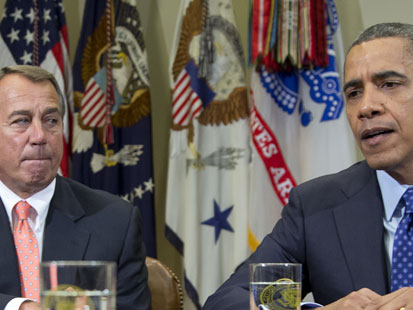Could Outgoing Republicans Hold Keys to 'Fiscal Cliff'?

AP Photo/Carolyn Kaster
The outlook for reaching some sort of bipartisan agreement on the so-called "fiscal cliff" before the Dec. 31 deadline is looking increasingly grim. Shortly after noon today, House Speaker John Boehner, R-Ohio, appeared before the cameras to say the talks had reached a "stalemate."
But there may be a glimmer of hope. There are currently 33 outgoing members of Congress - they're either retiring or were defeated last month - who have signed the Grover Norquist pledge stating that they will not raise taxes. Those members, particularly the ones who have traditionally been somewhat moderate, could hold the key to that stance softening.
"You have 33 people who do not have to worry about the future political consequences of their vote," said ABC political director Amy Walter. "These are people who theoretically can vote based purely on the issue rather than on how it will impact their political future."
One outgoing member has publicly indicated a willingness to join with Obama and the Democrats on a partial deal.
"I have to say that if you're going to sign me up with a camp, I like what Tom Cole has to say," California Republican Rep. Mary Bono Mack said on CNN on Thursday. Cole is the Republican who suggested that his party vote to extend the Bush tax-rates for everyone but the highest income earners and leave the rest of the debate for later. Mack's husband, Connie, however, also an outgoing Republican member of Congress, said he disagreed with his wife.
But in general, among the outgoing Republican representatives with whom ABC News has made contact, the majority have been vague as to whether or not they still feel bound by the pledge, and whether they would be willing to raise tax rates.
"[Congressman Jerry Lewis] has always been willing to listen to any proposals, but there isn't," a spokesman for Rep. Lewis, Calif., told ABC News. "He's said the pledge was easy because it goes along with his philosophy that increasing tax doesn't solve any problems. However, he's always been willing to listen to proposals."
"Congressman Burton has said that he does not vote for tax increases," a spokesman for Dan Burton, Ind., said to ABC.
"With Representative Herger retiring, we are leaving this debate to returning members and members-elect," an aide for Wally Herger, Calif., told ABC News.
The majority of Congress members will likely wait until a deal is on the table to show their hand either way. However, it stands to reason that if any members of Congress are going to give in and agree to raise taxes, these would be the likely candidates.
An agreement will require both sides to make some concessions: Republicans will need to agree to some tax increases, Democrats will need to agree to some spending cuts. With Republicans and Democrats appearing to be digging further into their own, very separate territories, the big question is, which side will soften first?